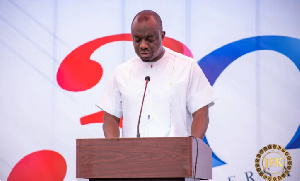Business News of Tuesday, 3 December 2002
Source: Daniel Allan
Ghanaian Banks- Strangling the Economy into extinction
The Ghanaian economy has been ailing for a long time. Government needs money to work, the recent IFC loan saga showed clearly. In view of this it is frightening to learn that less than 20% of Ghanaians save in the banks.
Where does all the money go? Do people have the money but do not save it or they have no money to save at all? Are the banks positioned to mop up the excess money in the system or people rather do not want to have anything to do with them at all?
Research has shown that even though per capita income in Ghana is low and that a lot of Ghanaians live below the poverty line and do not have money to save in the first place, a lot of people who have money prefer to save it outside the banking system. The banks are crying. The situation has dire consequences for the economy.
The fault is mainly the cause of the banks themselves. People have begun to perceive them as edifices of exploitation. For example, whereas in a developed country like the UK, with a high per capita income and GDP, the minimum deposit and account balance required by most banks is just about 0ne Pound sterling (the equivalent of 13000 cedis), in Ghana, a poor country, you need between 50000-1000000 cedis (about 4-77 pounds) for the same. The call from the Governor Of The Bank Of Ghana and the Minister Of Finance for the banks to review their rates is therefore in the best of directions.
A survey has shown that most Ghanaians including some of those who can afford to leave the required minimum deposit in the banks find it incomprehensible that their hands are tied from touching these moneys if they should want to touch it. A lot of such people, especially market women are resorting to ?Susu? ventures (saving privately with friends and cooperatives) to save money. Some are keeping the money under their beds and yet others are resorting to lend the money out for profit. Others including international businessmen and women, keep a large amount of foreign currency on them to avoid the banks. This sometimes results in massive loss in the case of fire and theft and leads to further losses to the economy. It also leads to situations where there is a lot of money in the economy that government has no control over and therefore cannot even tax.
The reason that banks in the UK are not been able to exploit their clients in the way ours do here is because of public outcry. Consumer vigilance or public outcry has worked very well in the UK. It stopped the banks from ?illegally? exploiting their clients by penalizing them twice anytime they withdraw money from the wrong cash machine and it stopped the banks from closing branches in villages. The banks can chose to avoid government admonition. However, they cannot fight consumer uprising.
To make sure that our banks stay healthy, consumer rights has to become an issue in this country. Our media houses need to take up some of these issues. A couple of years ago, the banks found very innovative ways to make money. Instead of investing outside the government set up, a lot of them begun to purchase treasury bills from government. What occurred therefore was that the government used taxpayer?s money to pay interest to these the banks.
In another dimension, when the banks make money, to avoid paying tax, they avoid declaring huge profits by giving a lot of the money to their workers as car loans on concessionary terms.
Without doubt, banking operations in this country must be streamlined so that they do not put the economy out of gear. That should be our preoccupation. However, under the HIPC initiative the IMF has been urging Ghana to privatize some state owned enterprises including the Bank Of Ghana.
Of all the banks, Ghana Commercial Bank possibly because of its beginnings as the ?people?s? bank, is one of the most consumer-friendly. Its minimum deposit is relatively reasonable when compared with other banks. Its customer care, however, has not been very good. That not withstanding, Ghana Commercial Bank appears to be the most profitable bank at the moment. Contrary to the assumption that a bigger minimum deposit increases profitability, Ghana Commercial Bank?s relative low minimum deposit has endeared many ordinary citizens to save with it. This has subsequently increased its profitability. When Ghana Commercial Bank completes its computerization policy and improves on customer care, it may even capture high-level clients from many of the private banks.
It is for this reason that the IMF policy of privatizing the national bank sounds baffling. As the saying goes, you do not change a winning team. There is nothing to show that privatization solves anything. Indeed, most of the banks that are not doing too well are private banks.
Increasing efficiency in the national bank can be done without putting the bank into private hands. Already, the private banks are exploiting Ghanaians at levels that are far higher than the levels in their own countries of origin. There is nothing to show that the situation will not be worsened if the bank is privatized.
If the Bank is privatized, a lot of the profits that the bank makes and which comes to the government will go to the individuals or nations that will come to own the bank. As a nation, we need to present a united front against this venture. We also need to put the correct mechanisms in place if we want the banks to be efficient. This is one situation for which we need to put political colourations aside and work together nationally.
The economy seems to be suffering from diarrhea. People are crying for increases in their wages. They are struggling to save money to cater for their children and provide shelter for themselves. At the same time the banks are making atrocious requirements that make it impossible for people to save. And the government is suffering because the people are not saving in the banks. We are being asked to privatize our most profitable bank. The complication can be solved with good medicine.
That we have a problem is not in doubt. Whether we have the guts, as a nation to stand together and ensure that the right medicine is applied to the right ailment is the problem.











